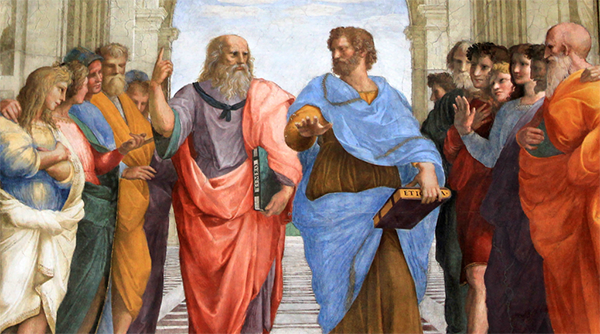Philosopher Parents, Not Kings
- JOHN CUDDEBACK
The term 'philosopher kings' sticks in the head of students of ancient philosophy.
 School of Athens (detail) by Raphael, Public domain, via Wikimedia Commons.
School of Athens (detail) by Raphael, Public domain, via Wikimedia Commons.
In Plato's Republic Socrates memorably asserts that "until philosophers take control of a city, there'll be no respite from evil for either city or citizens..."
Plato's assertion here has less to do with 'kingship' versus other forms of rule than with the characteristics of whomever is ruling. Those who rule should prioritize the pursuit of wisdom and virtue. Images of snatching tweed-jacketed men from universities and shoving them into the White House miss the mark. The point is that a society that prioritizes true human flourishing will seek ways to bring wise souls into positions of power, in various forms of government.
This point remains applicable today. But political rule is not the only rule in society. Political decline or flourishing is clearly tied to that of the household, another community with 'rulers.' If Plato failed to see the importance of the natural family household, his student Aristotle did not. Aristotle saw households related to political society as parts to an organic whole. And the rule of parents in the home is in certain ways like the rule of kings in their realm.
Of rule in the household Aristotle says, "Hence the ruler ought to have moral virtue in perfection, for his function, taken absolutely, demands a master artificer..." This wonderful image of ruler as a craftsman of virtue comes straight from Plato writing of the philosopher kings: "Do you think that he will be a poor craftsman of moderation, justice, and the whole of popular virtue?"
All authority and ruling in their best forms are about crafting human flourishing. But to do such crafting well, to be a master craftsman, one must be a lover and seeker of the higher things. Plato describes such people as those who out of love 'study' and 'consort with' things divine. "Do you think that someone can consort with things he admires without imitating them?" And not only imitating them, these philosopher-rulers seek to craft those under their care according to "the divine form and image."
Philosopher parents. Here is our calling as sketched by the greatest among the Greek wise. Here is an insight, an image, and a challenge for the ages.
Perhaps more than ever, if I am to be the parent I am called to be, my children need me to be, and I so want to be, I really must be a 'philosopher' of sorts. In other words, regardless of my intellectual prowess or academic formation, I must like Socrates daily search out, deliberate, and discuss virtue and how to live it and how to craft it in my home. This doesn't mean I have to be the smartest or most well-read person on the block. It does mean that in getting married, I committed with my spouse to strive to become master-craftsmen in the most glorious of arts.
 This is J. Fraser Field, Founder of CERC. I hope you appreciated this piece. We curate these articles especially for believers like you.
This is J. Fraser Field, Founder of CERC. I hope you appreciated this piece. We curate these articles especially for believers like you.
Please show your appreciation by making a $3 donation. CERC is entirely reader supported.

Acknowledgement
 John Cuddeback. "Philosopher Parents, Not Kings." LifeCraft (October 4, 2023).
John Cuddeback. "Philosopher Parents, Not Kings." LifeCraft (October 4, 2023).
Reprinted with permission from the author.
The Author
 John Cuddeback is professor of Philosophy at Christendom College and the author of True Friendship: Where Virtue Becomes Happiness and Aristotle's Ethics: A Guide to Living the Good Life. He and his wife Sofia consider themselves blessed to be raising their six children—and a few pigs and sundry—in the shadow of the Blue Ridge on the banks of the Shenandoah.
John Cuddeback is professor of Philosophy at Christendom College and the author of True Friendship: Where Virtue Becomes Happiness and Aristotle's Ethics: A Guide to Living the Good Life. He and his wife Sofia consider themselves blessed to be raising their six children—and a few pigs and sundry—in the shadow of the Blue Ridge on the banks of the Shenandoah.


